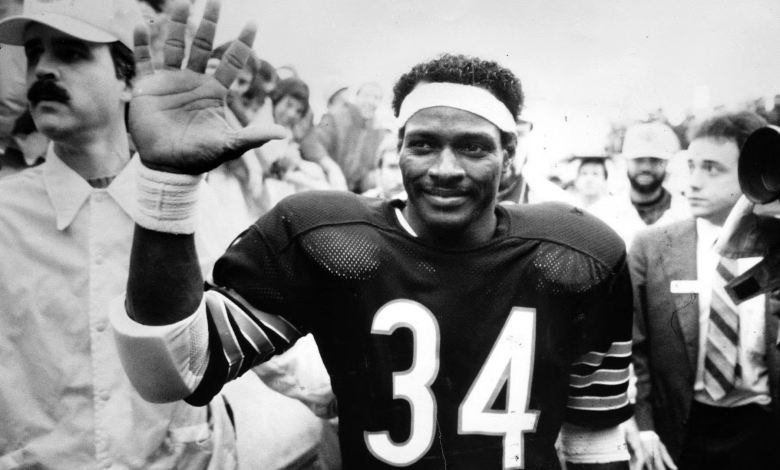Walter Payton entered the 1975 NFL Draft amid Chicago’s struggling legacy, but he brought hope, transforming the Bears’ fortunes and inspiring a new era of greatness beyond their past disappointments.

When Walter Payton stepped onto the stage of the 1975 NFL Draft, he did more than just walk into a league; he carried with him the hopes and aspirations of a city that had long yearned for a hero. The Chicago Bears, a storied franchise with a rich history but a bleak recent past, faced an uncertain future filled with losing seasons and fading glory. Their legacy was once defined by the legendary Gale Sayers, whose electrifying play electrified fans and brought excitement to a franchise that desperately needed a spark. But by the early 1970s, the Bears had fallen on hard times, their once-proud tradition overshadowed by mediocrity and disappointment.
In that moment, as NFL teams made their selections, Walter Payton’s name was called. The world would soon discover that this was not just a talented running back entering the league; it was a transformative figure who would redefine what it meant to be a Chicago Bear. His arrival marked the beginning of a new chapter—one filled with hope, resilience, and the relentless pursuit of greatness.
The Context: A Franchise in Need of Revival
The Chicago Bears, founded in 1919 and one of the oldest franchises in the NFL, had experienced both glory and hardship over the decades. Their most iconic era, during the 1960s, saw the team win NFL championships in 1963 and 1964, led by legendary players and coaches. Gale Sayers, the “Kansas Comet,” was a shining star during this period—an electrifying running back whose agility, speed, and instinct made him a fan favorite and a Hall of Famer.
However, by the early 1970s, the Bears struggled to replicate that success. The team’s performance declined, and the franchise faced a period of instability and mediocrity. The city’s fervent football fans, accustomed to excellence and excitement, grew restless. The Bears needed a new hero—someone who could galvanize the team and restore pride to the fan base.
The 1975 NFL Draft became a pivotal moment for the franchise. The Bears held the 4th overall pick, and their decision would shape their future. Many scouts and analysts believed this draft was deep with talent, particularly at the running back position. The Bears, recognizing their need for a game-changing player, set their sights on a young man from Jackson State University—Walter Payton.
Walter Payton: The Man and the Player
Walter Payton was born in 1954 in Columbia, Mississippi. From a young age, he exhibited extraordinary athletic ability, excelling in multiple sports. At Jackson State, he became a dominant force, showcasing speed, strength, and an uncanny ability to read defenses. His college career was marked by record-breaking performances and a reputation as one of the most complete running backs in college football history.
What set Payton apart was not just his physical talent but his work ethic and character. He was known for his humility, discipline, and relentless drive—attributes that made him a perfect fit for a franchise seeking to rebuild its identity. His leadership qualities and unassuming demeanor endeared him to teammates, coaches, and fans alike.
When the Bears selected Payton with the 4th overall pick, it was widely seen as a gamble that could pay off—an investment in a player with the potential to change the franchise’s trajectory. Few could have anticipated just how profound that impact would be.
The Transition: From Rookie to Rising Star
Walter Payton’s rookie season in 1975 marked the beginning of an era. Although the team struggled overall, Payton’s individual performances stood out. He quickly demonstrated his vision, agility, and determination on the field. His running style was smooth yet aggressive—a perfect blend of power and finesse.
Payton’s ability to gain tough yardage in critical situations made him a fan favorite almost overnight. His work ethic was evident in practices, where he pushed himself relentlessly, often inspiring teammates to elevate their own effort. Despite the team’s losing record that season, Payton’s star was on the rise.
Over the next few years, Payton’s impact grew exponentially. He amassed rushing yards, touchdowns, and records, but more importantly, he became the symbol of hope for a battered franchise and a disillusioned city. His humility and dedication resonated deeply with fans and players alike, creating a sense of unity and purpose within the organization.
Transforming the Franchise: The Power of a Leader
Walter Payton’s influence extended beyond his statistics. He became the heartbeat of the team—a leader by example and a rallying point for the entire organization. His leadership qualities inspired teammates to perform at their best, fostering a culture of resilience and perseverance.
The Bears’ coaching staff and management recognized that Payton’s presence could catalyze a turnaround. They invested in building around him, drafting complementary players, and emphasizing discipline and teamwork. The city’s fans, who had endured years of disappointment, now saw a glimmer of hope in their young star.
Payton’s dedication to excellence and his unyielding work ethic set a standard for everyone in the organization. He was often the first to arrive at practice and the last to leave, exemplifying the relentless pursuit of greatness. His attitude was infectious; it pushed others to elevate their game and embrace the challenging process of rebuilding.
The 1980s: A New Era of Dominance
By the early 1980s, the fruits of Payton’s leadership began to materialize. The Bears became more competitive, making playoff runs and gaining national attention. The team’s defense, famously known as the “Monsters of the Midway,” complemented Payton’s offensive prowess, creating a balanced and formidable squad.
The 1985 Chicago Bears, in particular, etched their name into NFL history. Led by coach Mike Ditka and a dominant defense, the team captured the Super Bowl XX title, with Payton playing a crucial role throughout the season. His leadership on and off the field exemplified the ideals of perseverance, humility, and unity.
Payton’s influence extended beyond the game. He became a symbol of hope for Chicago residents, embodying the city’s resilience and fighting spirit. His performances and character inspired countless fans and aspiring athletes, cementing his legacy as one of the greatest players in NFL history.
Legacy Beyond the Field
Walter Payton’s impact wasn’t limited to his playing career. His dedication to philanthropy, particularly his work with children and charitable organizations, demonstrated his commitment to making a positive difference in the community. His “Never Die Easy” philosophy reflected his approach to life—facing challenges head-on with courage and grace.
In 1999, Payton passed away after a rare liver disease, but his legacy endures. The NFL named the Walter Payton Man of the Year Award in his honor, recognizing players’ community service and leadership. His influence persists as a symbol of perseverance, humility, and hope.
The Chicago Bears, once desperate for a hero, found in Payton a leader who transformed their fortunes and rekindled their spirit. His journey from a promising rookie to a franchise icon exemplifies how one individual’s character and talent can uplift an entire community.
A Legacy of Hope and Greatness
When Walter Payton stepped onto the NFL stage in 1975, he carried the weight of a city longing for hope and a franchise yearning for revival. Through relentless effort, unwavering humility, and unmatched talent, he became more than just a football player—he became a symbol of resilience, determination, and community pride.
His legacy is a testament to the transformative power of leadership rooted in character and perseverance. The Chicago Bears’ resurgence from the depths of disappointment to NFL champions was fueled by Payton’s inspiring example—a reminder that sometimes, what a team and a city need most is someone who embodies hope and refuses to give up.
Walter Payton’s story continues to inspire generations, proving that greatness is built not just on records and trophies, but on the integrity, dedication, and hope one individual can ignite within a community. The Bears’ journey from despair to victory is forever linked to his name—a legacy that endures long after the final whistle.









